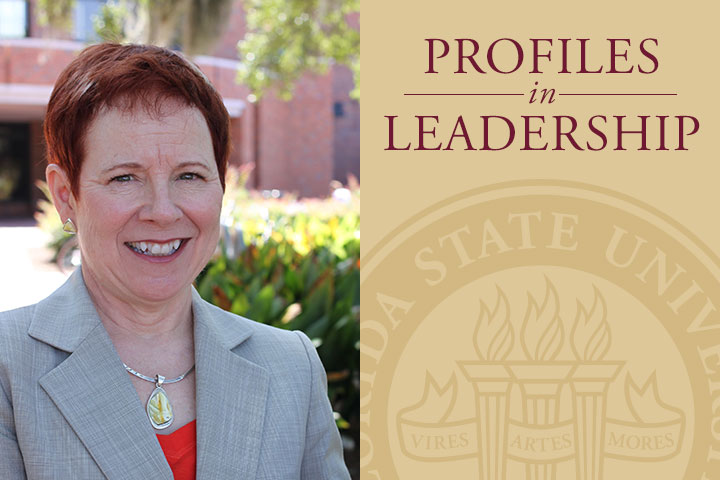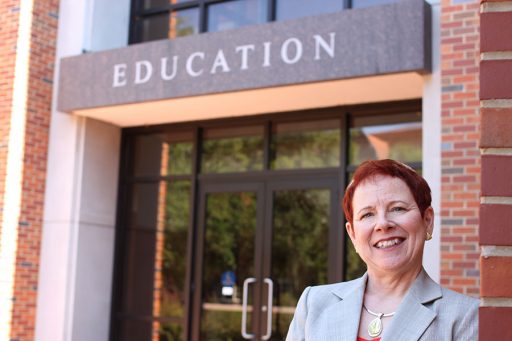
Florida State University College of Education Dean Marcy Driscoll smiles as she reflects on her journey with FSU. The petite woman’s passion for education shines even brighter than her signature red hair.
Dean Driscoll is a longtime faculty member at FSU; she joined the garnet and gold family in 1980.
“A friend who graduated from Florida State called me up and said ‘FSU has a job opening. They don’t know it yet, but they are looking for you. You must apply for this position.’ I did, and as they say, the rest is history.”
Driscoll’s academic history began at Mount Holyoke College in Massachusetts. She then went on to receive her master’s and doctorate degrees from the University of Massachusetts, Amherst.
Opportunities after her doctoral studies consisted of stints in Iran and New York. During her time in the empire state working in the Office of Mental Health, she decided she missed the academic setting.
After being hired in 1980 as an assistant professor of instructional systems and educational psychology, Driscoll worked her way up through the ranks. She became department chair of Educational Research in 1996.
“As a faculty member, there comes a time when you decide you either don’t like administration and you go back to being regular faculty or you like administrative work and start thinking about your career in a different way,” Driscoll said.
For her, it was the latter. She enjoyed administrative work and, in fact, felt she was pretty good at it. She served as associate dean of research and administration from 2003 to 2005 before taking over as dean in May 2005. She is now closing in on 12 years as dean of the college.

“I really enjoy it,” Driscoll said. “There’s a lot of creativity in developing talent among faculty and students and finding the resources that faculty need to be successful — to help them achieve the goals to be the best they can be. There’s a lot of satisfaction in seeing people do those things and getting them the resources they need to do it.”
Driscoll also understands her role as a fundraiser and says she enjoys that part of the job, too.
“It’s really fun to work with our alumni and friends of the college and university to help raise money to support our mission,” Driscoll said.
She recalled one story of two alumni in their late 80s. The two became friends back when FSU was the Florida State College for Women and, ultimately, they became teachers. The pair was among the first people Driscoll met once she became dean.
“They’re passionate about helping us do a better job of preparing teachers. They wanted to give back and they’d already established a fund for professional development.”
As she got to know them, they expressed their interest in doing more for the college and gave Dean Driscoll the first multimillion dollar planned gift under her leadership. The $2 million bequest went toward developing a center for helping teachers become better at teaching reading.
Driscoll remembers the surprise from the former Provost Larry Abele at the time of the announcement.
“His question to me was, ‘Who are these people? We have school teachers who can make that kind of a bequest?’ And I said, ‘Well, yes, if school teachers are frugal and invest well and are great friends of FSU, it can happen.’”
Another great friend and Florida State alum who Driscoll acknowledges as one of the most amazing individuals she’s ever met is Marvalene Hughes. Hughes is a regular supporter of the college’s annual research symposium, which Driscoll says is one of her favorite events. The symposium is a time when students and faculty present their research to each other. Driscoll says the symposium has led to research collaborations and new opportunities to apply for grants.
Hughes challenged the college last year by offering to double her funding for the symposium if the college incentivized research on the plight of black males in America. Driscoll said many of those issues span well beyond education into areas such as criminal justice and social work. That propelled the COE to collaborate across college boundaries at FSU as well as with Florida A&M University.
Driscoll said Hughes’ challenge brought focus to the work the college was already doing in that area. In the near future, she hopes they can create a center that would provide a context and a place for a lot of the work to be conducted.
But fundraising successes and major research aside, Driscoll recognizes her job isn’t getting any easier.
“We know there’s a looming teacher shortage, and it’s not just local or state — it’s a national issue,” Driscoll said. “Education in general has been under attack for a while. It’s harder and harder to be a teacher. More and more is expected of teachers.”
Part of what Driscoll says she never expected to be doing as a dean was spending time advocating for the profession of teaching.
“I just assumed people would see the value we see, but the conditions for teachers are difficult. I do try to spend time with legislators and policymakers, trying to help them understand how we see it.”
However, Driscoll is encouraged by what she sees among the current generation of young people and what she says is a generation interested in helping their fellow man and making a difference.
“People remember the people who made a difference for them — and they’re almost always teachers,” Driscoll said.
“People remember the people who made a difference for them — and they’re almost always teachers,” Driscoll said.
As Driscoll completes her 12th year, that’s what she sees for her college.
“I want a college that makes a difference,” Driscoll said. “That is, doing work that contributes to the betterment of our society, the improvement of education and education professions.”
Driscoll also noted that the college does much more than just prepare teachers; they also have degree programs in professional areas such as counseling, school psychology and sport management, which are all building strong reputations.
“We’ve been climbing in the national rankings,” Driscoll said. “We were well below 50 when I started. Now we’re No. 37, and if you look just at public colleges of education we’re No. 25.”
Driscoll said the rankings contribute to improving how the college operates. The college is in the process of working on a strategic plan set to be finalized in late spring or early summer. Driscoll believes out of that plan will come some specific areas in which the college can “plant their flag.”
One area Driscoll would like to see the college focus on is underserved populations. She noted that Tallahassee and our surrounding communities have a lot of rural areas with high needs.
“This is an area where we can make a difference in our immediate community,” Driscoll said. “Learning from the work that we do with them can potentially have an impact on education not only in the state, but in the nation.”
The College of Education has become a leader on campus. But even more importantly, Driscoll wants to be a partner to the other colleges at FSU.
“When you look at some of the different problems we’re trying to solve, one college, one faculty member is not going to do it. There has got to be collaboration with each other. When you get a bunch of smart people together, amazing things can happen.”
Driscoll believes the college’s impending strategic plan is already in line with the university’s strategic plan that, among other things, promotes entrepreneurship and collaboration. She is looking forward to what is to come with her college and is confident her team can contribute to FSU’s larger transformation as well.
“It’s interesting when I think about just the transformation that’s been occurring in the college. I’ve hired about 70 to 75 percent of faculty and two-thirds of the staff. The people we have brought in have been just remarkable. It makes me really proud that this is what we are building.”
“Profiles in Leadership” is a continuing web series that will feature Florida State University deans, directors and administrators and their respective colleges, schools, departments and centers.




